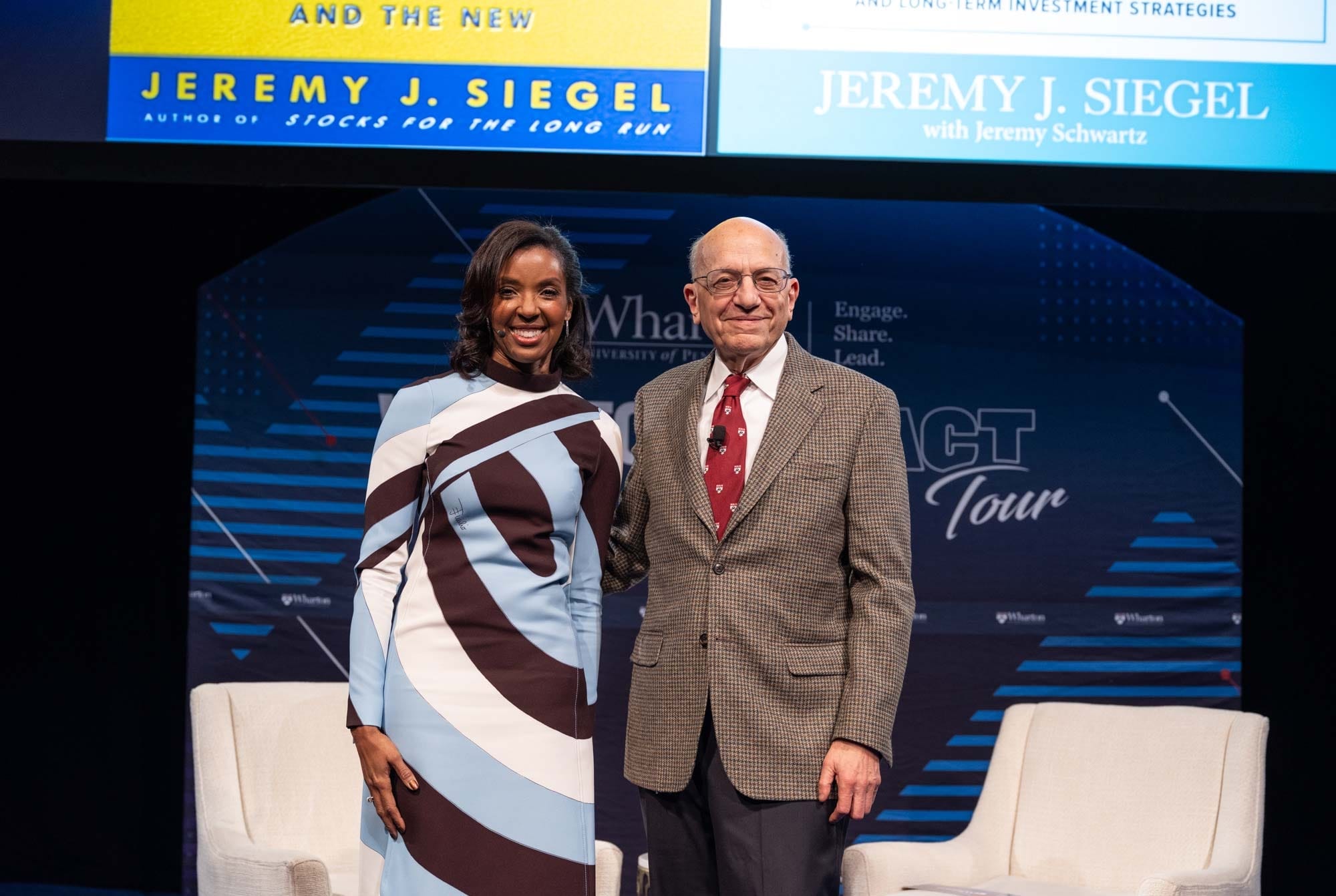Wharton alumni and supporters filled New York City’s Gotham Hall on the evening of February 21. The 1920s-era venue, complete with vintage bronze teller windows and a grandiose stained-glass skylight spanning the entire room, was originally a bank — a fitting setting for finance superstar Jeremy Siegel.
The penultimate stop on this year’s Wharton Impact Tour began with hors d’oeuvres and conversations between alumni and friends. In her opening remarks, Dean Erika James introduced new Wharton External Affairs Chief Advancement Officer Bill Bole, who shared a poignant story about a scholarship recipient and thanked alumni for their engagement with the School.
As the Dean took the stage again, she echoed Bole’s sentiment, sharing that the first few weeks of 2024 have shown her the resiliency of the Wharton School.
“Interest in our degree programs has not waned,” Dean James said. “That tells me the best and brightest students still want to come to Penn and Wharton.”

Wharton Impact Tour New York was held in Gotham Hall.
A round of intense applause filled the ballroom when Dean James called attention to Wharton’s MBA and undergraduate programs recapturing their rank as the best in the world according to the Financial Times. What sets Wharton apart from all the other business schools in the world, James said, is the School’s global alumni network.
“Our students’ career outcomes are as strong as ever. They’re still landing incredible internships and securing premier job opportunities post-graduation, in many ways, thanks to you,” she said. “You are the passionate and powerful fuel that propels us to new heights year after year.”
The crowd’s enthusiastic cheers vibrated throughout Gotham Hall once again when Dean James welcomed Russell E. Palmer Professor Emeritus of Finance Jeremy Siegel to the stage, his decades of market insights in tow. Siegel, a best-selling author and an authority on financial markets, delivered an investing lesson with data from the day before. “I wanted to use stocks from today, but they told me it was too late,” Siegel, famous for teaching about the market in real-time, said, and laughed with the attendees.
The otherwise lively crowd was silent during Siegel’s lesson, mesmerized by the legend sharing his craft. “Take a look at the stock line compared to all of the other lines,” he said, pointing at the presentation on the screen behind him. “Stocks are the most volatile asset class in the short run, but they’re the most stable asset class in the long run.”
After Siegel’s session, he sat down with Dean James, and the pair answered questions from the audience, including one on how Wharton students have changed or stayed the same through the years. “We keep that excellence and that seriousness,” Siegel said.
After the standing-room-only talk, the audience headed to the mezzanine and bar for a spirited networking reception.
“Jeremy Siegel can still pack them in,” said Andrew Brenner C78 W78 WG78. “Everyone wants to know how to make money, and Stocks for the Long Run [is his advice]. He isn’t always right; sometimes he fights against the grain. But you know what? He’s more right than wrong.”
The audience was full of former Siegel students, including Jennifer Gregoriou W78, director of membership and marketing for the Penn Club and a Wharton Club of New York board member.
“It’s amazing to see how he’s still relevant and the power he has,” said Gregoriou. Former classmates Brenner and Gregoriou praised Siegel’s ability to entertain while imparting financial wisdom. Gregoriou has seen this magnetic style of teaching pass down to other Wharton professors.
“With their knowledge and their expertise and their years of watching the markets, it’s like when I go to a doctor,” Gregoriou said. “I’m like, ‘Give me someone who’s been practicing for 40 years. They’ve seen my case.’ It was that type of experience.”

Professor Jeremy Siegel and Dean Erika James reflected on Siegel’s long tenure at Wharton.
Between a lecture from an emeritus finance professor and the surroundings of Gotham Hall, it was easy for attendees to become immersed in the history of commerce. Subway-esque globe lights and a giant wrought iron clock are some of the architectural elements that have secured the venue’s status in the U.S. National Register of Historical Places as the Greenwich Savings Bank Building. It served as that financial institution’s headquarters from 1924 to 1981.
Over the years, New York City has been an obvious destination for many alumni, including Arthur Bass W73, whose first job on Wall Street upon graduation launched a quarter-century-long career in fixed income securities and derivatives. Today, about a quarter of all Wharton graduates are based in the New York City metro region.
“Finance is a strong suit of the School, and New York is the financial capital, so it’s natural that that’s where a lot of the alumni would end up,” said Bass, who traveled from Connecticut for the event and said the presentation was “fabulous.”
Udayan “Udi” Chattopadhyay WG01 said the Impact Tour was a great way to catch up with friends who have become more senior in their careers and thus harder to gather. Chattopadhyay also has a rich history with the city: He got involved with the Wharton Club of New York in 2007 as a way to expand his business development skills and went on to help the club raise more than $3 million in FY23 as its vice president of university relations sponsorship. Like other alumni, he celebrated New York City as a bustling international business hub: “It’s a place where people are always passing through, and it’s fun to be part of that.”


























